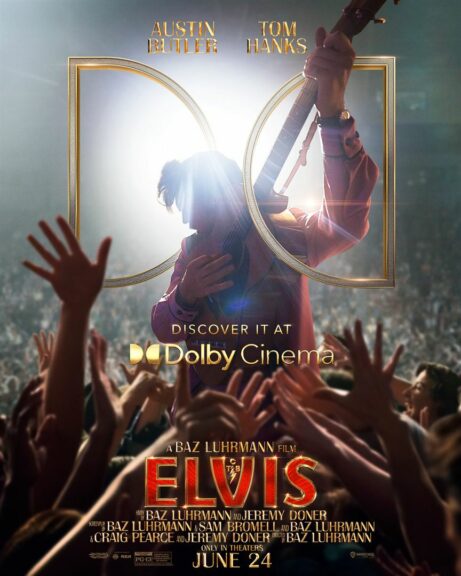
The life and musical work of Elvis Presley through the lens of his complex relationship with his mysterious manager, Colonel Tom Parker. The film will explore their relationship over a period of twenty years, from the singer’s rise to unparalleled stardom, against a backdrop of cultural upheaval and America’s discovery that innocence is over.
Paradoxes can sometimes be found in any critical analysis, perhaps where we don’t expect them. Artistically speaking, Luhrmann‘s Elvis is a successful film: rather virtuoso editing effects, visual transitions of the most beautiful effect, in spite of their technicality, a permanent whirlwind of images and a formal research of all the shots, an omnipresent sound universe and somewhere a supported homage to the music of Presley, actors who give themselves up to give body to their characters, an ambitious point of view, and a narrative frame which avoids the easinesses of the biopic to prefer them a construction based on the sensations, and their evolutions (the feeling before the facts). .. These are arguments that we would usually like to put forward. In addition to these, there is another obvious success, on the technical level this time, whether it is the dollies that run along the walls and through the windows, the devilishly animated splitscreen, Vegas style, the careful lighting, the particular photography but faithful to the image that one can have of the Elvis Presley show, choreographies that perfectly imitate those of Presley, a list that we could extend almost to the envy so much Luhrmann assumes his style as ever, even if it means irritating the most ascetic, or the most allergic to the supported visual.
A step further than Moulin Rouge!, or The Great Gatsby, Lurhmann invites us once again to a party, lasting more than two and a half hours, where the pace never slows down. And yet …
As much as we are among those who take exception to the easy criticism – which we do not share – of Beineix’s hypercolored, visual and advertising universe when he proposed the magnificent Diva, it seems to us that Baz Luhrmann has missed a much greater – and more interesting – film, by unbalancing his story by trying too hard to sublimate it with images. Not that his script is not relevant, not that it lacks bounces, surprises, interesting subjects, on the contrary … Perhaps the interpretation of the main actor Austin Butler, but also that of Tom Hanks, best embody this paradox: being good is not always enough. Because both of them objectively struggle and make amazing transformations, and their involvement and work are noticeable. Somewhere we could talk about a role in Oscar. Yes, but for both of them, something doesn’t work and we can’t blame them. For the second, the dress exceeds the character, the overflow of latex, without being visible, composes a character in which we do not believe. For the first, it suffers from a terrible observation, even transformed to excess, we do not see Elvis Presley, but an actor disguised in the manner of Elvis Presley, which in the end, does not look like him. Thus, the main and major defect of the film is the lack of truth.
However, and whatever Luhrmann extracts from it the right components, that this subject was cinematographic! Elvis Presley, the character, as well as the man, are modern myths… There is so much to say, so much to show, so much to analyze and to give food for thought. Behind the man, a country, souls, an extraordinary talent, flaws, demons … A success story coupled with a terrible tragedy, the very image of America. An incomparable symbol and precursor of a society whose dream often hides a reverse side, and which, if it rises, often reproduces the same pattern, always carried by a loss of reference points, an ever more which never finds limits; and sacrifices its greatest artists precisely for their talent – Michael Jackson will follow.
Luhrmann himself seems carried away by this need for more and more, where precisely he would have benefited from remaining humble in the face of the greatness of the subject he was tackling, and which could only, inexorably, have passed him by. Some people regret that the Australian director (and not American, perhaps an inexorable flaw that can explain this strange feeling of too much distance) did not stick to the facts, that he did not propose a biopic that seemed so obvious – the ease would have led him to it … We do not share this point of view. The enterprise would certainly have been a success, if Luhrmann had had the idea not to privilege the artistic, but the material at his disposal. His diamond should not be too polished… Raw, original, it would have come out more naturally. The tone on tone, the rhythmic overkill – so many springs – would have gained by giving way to a greater questioning. We would have appreciated it if Elvis’ torments had not come suddenly and so clearly, but if, on the contrary, in the manner of Born to be Blue, they had been delivered to us in a temporality closer to real time, with nuances, evolutions, and a darker side that was more prevalent. That we would have appreciated that instead of the numerous remakes of Elvis’ songs we were entitled to the original songs. That we would have appreciated that the archive extracts were more numerous, that they came to question and nourish the fiction, especially since Luhrmann knew perfectly how to mix different chronological times to put them in perspective. It is a pity that we come out of this film with the impression of a big show that, in the end, only scratches the surface of the complexity and power of its subject. Elvis could have been Luhrmann’s masterpiece, it does not surpass Moulin Rouge!.

